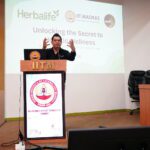healthy soch
New Delhi, September 03, 2019:
I have just returned from a visit to the Democratic Republic of the Congo with United Nations Secretary-General António Guterres to review the response to the Ebola outbreak. I was reminded once again that Ebola is just one symptom of a deeper problem: when people don’t have access to health services, or those services are of poor quality or don’t meet their needs, diseases can spread and lives can be lost.
That’s why the High-Level Meeting on Universal Health Coverage (UHC) at the United Nations General Assembly on 23 September is so important. It’s a historic opportunity for world leaders to ensure that no one is denied access to the health services they need simply because they cannot access or afford them.
In 2015, world leaders made a commitment to achieve UHC by 2030 as part of the Sustainable Development Goals. In the lead-up to the General Assembly, WHO and partners will publish the latest version of the Global Monitoring Report on UHC, which will show we are off-course to meet that target. Far too many people still lack access to essential health services, or are pushed into extreme poverty by paying for them.
This September, all countries will sign up to the most comprehensive declaration on health in history. It builds on the commitments made by world leaders at the Astana Global Conference on Primary Health Care in 2018, in which all countries committed to strengthening primary health care as the foundation of UHC.
Specifically, countries will commit to investing in four major areas: robust financing mechanisms, high-impact services, a strong health workforce, and strengthened governance and institutional capacity.
My message at the high-level meeting will be clear: UHC is a political choice. I call on all leaders to make that choice – starting with participating personally in the high-level meeting and working to ensure that the meeting is a success. Everyone can express their support for #HealthForAll by signing this petition: who.int/health.
But UHC is also a smart economic choice. When countries invest in health, they lay a platform for gains in productivity and economic growth. When people are healthy, they can learn, earn, work and create. The benefits for businesses, economies, individuals, families, communities and countries are enormous.
WHO is committed to supporting countries on their path towards UHC through strategic support and technical assistance. These efforts will be bolstered by initiatives such as UHC2030, a global movement to build stronger health systems, and the UHC Partnership, a country-level resource that provides technical expertise, builds capacity and supports policy dialogue.
Supporting countries on the road to UHC and the other health-related targets in the Sustainable Development Goals is not a job for WHO alone. In addition to the UHC Global Monitoring Report, WHO and 11 other agencies will be releasing the Global Action Plan for Healthy Lives and Well-being for All on 24 September, which outlines the ways in which we will work together to deliver the SDG health goals by aligning our work, accelerating progress and keeping ourselves accountable for results.
The UN Secretary General’s Climate Action Summit, which will take place on 23 September alongside the UHC high-level meeting, will include two crucial health-related commitments: first to cut carbon emissions and reduce air pollution; and second to spur more investment in climate action, public health and sustainable development.
All of this adds up to a simple fact: in September 2019 the world is coming together to galvanize progress toward health for all. I look forward to seeing you at UNGA. If you are in NYC on 22 September, please join me for Walk the Talk, a celebration of health in the form of a walk, run, roll or ramble through Central Park.
helthysoch







